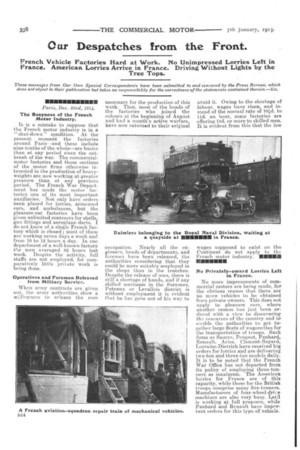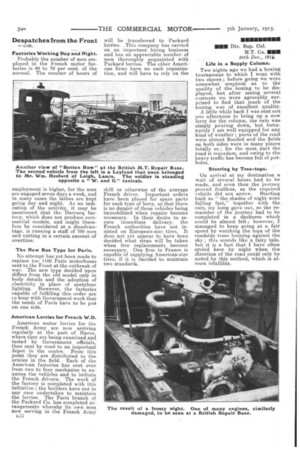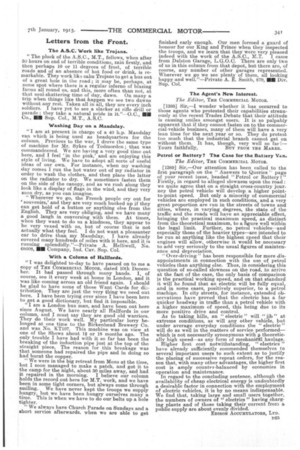ur Despatches from the Front.
Page 4

Page 6

Page 7

If you've noticed an error in this article please click here to report it so we can fix it.
French Vehicle Factories Hard at Work. No Unimpressed Lorries Left in France. American Lorries Arrive in France. Driving Without Lights by the Tree Tops.
These messages from Our Own Special Correspondents have been submitted to and censored by the Press Bureau, which does not object to their publication but takes no responstbility for the correctness of the statements contained therein.—En, Paris, Dec. 23rd, 1914.
The Busyness of the French Mater Industry.
It is a mistake to suppose that the French motor industry is in a " shut-down " condition. At the present moment the factories around Paris—and these include nine-tenths of the whole—are busier than at any period since the outbreak of the war. The commercialmotor factories and those sections of the motor firms otherwise interested in the production of heavyweights are now working at greater pressure than at any previous period. The French War Department, has made the. motor factories one of its most impoftant, auxiliaries. Not only have orders been placed for lorries, armoured cars, and ambulances, but the pleasure-car factories have been given unlimited contracts for shells, gun fittings and aeroplane darts. I do not know of a single French factory which is closed ; most of them are working seven days a week and from 10 to 12 hours a day. In one deportment of a well-known factory the men averaged 82 hours last week. Despite the activity, full staffs are not empfoyed, for comparatively little private work is being done.
Operatives and Foremen Released from Military Service.
When army contracts are given out the army authorities show a willingness to release the men necessary for the production of this work. Thus, most of the heads of the factories who joined the colours at the beginning of August and had a month's active warfare, have now returned to their wiginal occupation. Nearly all the engineers, heads of departments, and foremen have been released, the authorities considering that they could be more .suitably employed in the shops than in the trenches. Despite the release of men, there is still a shortage of hands, and if any skilled mechanic in the Suresnes, Puteaux or Levallois district is without employment it is evident that. he has gone out of his way to avoid it. Owing to the shortage of labour, wages have risen, and instead of the normal rate of 10,1d. to 11d. an hour, some factories are offering 14d. or more to skilled men. It is evident from this that the low wages supposed to exist on the Continent do not apply to the French motor industry. MERE No Privately-owned Lorries Left in France.
No more irnpressments of commercial motors are being made, for the obvious reason that there are no more vehicles to be obtained from private owners. This does not apply to pleasure cars, where another census has just been ordered with a view to discovering the resources of the country and to enable the authorities to get together large fleets of wagonettes for the transportation of troops. Such firms as Sourer, Peugeot, Panhard, Renault, Aries, Clement-Bayard, Lorraine-Dietrich have received big orders for lorries and are delivering two-ton and three-ton models daily. It is to be noted that the French War Office has not departed from its policy of employing three-tonners as maximum. The American lorries for France are of this capacity, while those for the British troops comprise many five-to/liners. Manufacturers of four-wheel-drive machines are also VerY busy. Lain is working at full pressure, while Panhand and Renault have important orders for this typo. of vehicle. Factories Working Day and Night.
Probably the number of men employed in the French motor factories is 60 to 70 per cent. of the normal. The number of hours of
employment is higher, for the men are engaged seven days a week, and in many cases the lathes are kept going day and night. As an indication of the activity, it may be mentioned that the Darracq factory, which does not produce commercial models, and might therefore be considered at a disadvantage, is running a staff of 700 men and nutting in a certain amount of overtime.
The New Bus Type for Paris.
No attempt has yet been made to replace tne 1100 Paris motorbuses sent to the Front at the outbreak of war. The new type decided upon differs from the old model only in body details and the adoption of electricity in place of acetylene lighting. However, the factories capable of fulfilling this order are so busy with Government work that the needs of Paris have to be put on one side.
American Lorries for French W.D.
American motor lorries for the French Army are now arriving regularly at the port of Havre, where they are being examined and tested by Government officials, then sent by road to an important depot in the centre. From this point they are distributed to the armies in the field. Each of the American factories has sent over from two to four mechanics to examine the vehicles and to initiate the French drivers. The work of the factory is completed with this initiation ; the builders have not in any case undertaken to maintain the lorries. The Paris branch of the Packard Co. has completed arrangements whereby its awn men now serving in the French Army
Df:0 will be transferred to Packard. lorries. This company has carried on an important hiring business and has an appreciable number of men thoroughly acquainted with Packard lorries. The other American firms have no such organization, and will have to rely on the skill or otherwise of the average French driver. Important orders have been placed for spare parts for each type of lorry, so that there is no danger of these vehicles being immobilized when repairs become necessary. In their desire to secure immediate delivery, the French authorities have not insisted on European-size tires. It does not yet appear to have been decided what steps will be taken when tire replacements become necessary. One firm in France is capable of supplying American-size tires, if it is decided to maintain two standarck.
NMI Div. Sup. Col.
M.T. Co. Mt. 20th Dec., 1914.
Life in a Supply Column.
Two nights ago we had a boxing tournament to which I went with two chums ; before going we were somewhat sceptical as to the quality of the boxing to be displayed, but after seeing several contests we were agreeably surprised to find that much of the boxin,g was of excellent quality. A little while back I was sent out one afternoon to bring up a new lorry for the column, the rain was simply pouring dawn, but fortunately I am well equipped for any kind of weather; parts of the road were almost flooded and the fields on both sides were in many places totally so ; for the most part the road is macadam, and owing to the heavy traffic has become full of potholes.
Steering by Tree-tops.
On arrival at my destination a wait of several hours had to be made, and even then the journey proved fruitless, as the required
vehicle did not arrive. Starting back as " the shades of night were falling fast," together with the rain, my lamp gave out, so the remainder of the journey had to be completed in a darkness which could be almost felt.; however, I managed to keep going at a fair speed by watching the tops of the roadside trees looming against the sky ; this sounds like a fairy tale, but it is a fact that I have often cycled here by night when the direction of the road could only be noted by this method, which is almost infallible. The A.S.C:Work like Trojans.
" The pluck of the A.S.C., M.T., fellows, when after 50 hours on end of terrible conditions, rain firstly, and then perhaps 10 or 11 degrees of frost, of terrible roads and of an absence of hot food or drink, is remarkable. They work like calm Trojans to get a bus out of a great hole in the road ; it may be, perhaps, at some spot where there is a regular inferno of blazing farms all round us, and this, more often than not, at that soul-shattering time of day, dawn. On many a trip when things like that happen we see two dawns without any rest. Taken all in all, they are every inch soldiers. I have yet to see a slacker at rifle drill or parade ; they take a natural pride in it."—O.C., Co., ME Sup. Col., M.T., A.S.C.
Washing Day on a Maudslay.
"I am at present in charge of a 40 h.p. Maudslaavan which is being used as headquarters for the column. Previous to the war, I drove the same type of machine for Mr. Sykes of Todmorden • that was commandeered. We are having a very good time out here, and I feel 'in the pink,' and am enjoying this style of living. We have to adopt all sorts of useful ideas of our own. For instance, when my washing day comes I run the hot water out of my radiator in order to wash the clothes, and then place the latter on the radiator to dry. We sometimes fasten them on the side of the canopy, and as we rush along they look like a display of flags in the wind, and they very soon dry, as you can imagine. "Wherever we go, the French people cry out for souvenirs,' and they are very much bucked up if they can get hold of a button or anything else from the English. They are very obliging, and we have many a good laugh in conversing with them. At times, when they want to do us a kindness, they appear to be very vexed with us, but of course that is not actually what they feel. I do not want a pleasanter car to drive than my Maudslay. I have already covered many hundreds of miles with it here, and it is running splendidly."—Private A. Helliwell, No. 08608, MI Company, Ind. Cav. Sup. Col.
With a Column of Hallfords.
"I was delighted to-day to have passed on to me a copy of THE COMMERCIAL MOTOR, dated 10th December. It had passed through many hands. I, of course, see it every week at -home in London, and it was like coming across an old friend again. I should be glad to have some of those Want Cards for distribution. They are just the very thing we need out here. I have been trying ever since I have been here to get a good dictionary, but find it impossible.
"I am a London bus man, and have been out here since August. We have nearly all Hallfords in our column, and I must say they are good old warriors. They do their work well. My particular lorry belonged at one time to the Birkenhead Brewery Co. and was No. KT107. This machine was on view at one of the Shows about 12 or 18 months ago. The only trouble I have had with it so far has been the breaking of the induction pipe just at the top of the straight piece. The reason for this breakage was that someone had repaired the pipe and in doing so had burnt the copper. "We were in the big retreat from Mons at the time, but I soon managed to make a patch, and got it to the camp for the night, about 30 miles away, and had it repaired in the morning. I believe our column holds the record out here for M.T. work, and we have been in some tight corners, but always come through smiling. We have never kept the troops we supply hangry, but we have been hungry ourselves many a time. This is when we have to do our belts up a hole tighter.
"We always have Church Parade on Sundays and a short service afterwards, when we are able to get
finished early enough. Our men formed a guard of honour for our King and Prince when they inspected the troops, and we learn that they were very pleased indeed with the work of the A.S.C., M.T. I came from Dalston Garage, L.o.o.c. There are only two of us in this column from that depot, but there are, of course, any number of other garages represented. Wherever we go we see plenty of them, all looking happy and well."—Private A. E. Smith, 879, EIM Div. Sup. Col.


















